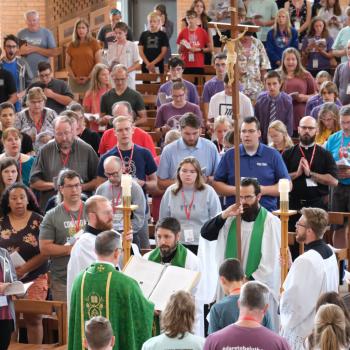“I don’t believe in God,” she said. “But I do believe in Life with a capital L.” Renaming God as Light and Life can preserve faith for some. Maybe your friends don’t believe in the God of your understanding but still believe in the God of theirs. Renaming God can help you and your “faithless” friends find common ground.

In this series, “Renaming God,” we look at alternative names for the Divine. These may help people come to terms with their own perception of Deity—even if their ideas don’t conform to yours. Even if they come from similar backgrounds, no two people are going to have the same relationship with God. By using varied language to describe individual experiences of Ultimate Reality, we can add depth to spiritual expression.
So far in this Series…
So far in this series, we have examined several names for God. I invite you to bookmark this page, check out my previous articles, and then return here to continue.
- Renaming God Can Rescue Your Floundering Faith Today
- Renaming God: The Way, The Tao, & New Perspectives
- Renaming God as Wellspring & Source
In these articles, I discuss non-anthropomorphic names for God. Today, I will continue to discuss alternative names for the Divine that may appeal to people who find it difficult to relate to a personal Deity.
I Am the Light of the World
Christians are familiar with Jesus’s statement that he is the Light of the World in John 8:12:
“Again Jesus spoke to them, saying, ‘I am the light of the world. Whoever follows me will never walk in darkness but will have the light of life.’”
As God, Jesus named himself ‘The Light.” We usually think of this as a metaphor. If you recall your English grammar class, a simile compares two things using “like” or “as.” You can remember this by seeing that the word “simile” looks similar to the word “similar.” So, a simile says that this is similar to that. A metaphor, on the other hand, compares two things without “like” or “as.” Instead of Jesus saying, “I am like light,” Jesus said, “I am the light.” Better than declaring himself to be like sunshine, Jesus said, “I am sunshine.” This gives his statement a lot more kick. It also allows us to use the word “Light” as a name for God.
God as Light
So, what are the properties of light, that represent the nature of God?
- The sun’s light provides energy to the world. Through photosynthesis and solar energy, the sun sustains life on the planet. Just as God in Genesis brought light and life to the world, God in Revelation is the light that replaces sun and moon. As light, God is the source of all life.
- Light provides information by allowing people to see what’s around them. Light allows learning. People read by lamplight. They tell stories and share experiences by campfires. Psalm 119:130 says, “The unfolding of your words gives light; it imparts understanding to the simple.” In this way, light represents divine truth and learning.
- Light keeps people safe by illuminating potential dangers. Psalm 119:105 says, “Your word is a lamp to my feet and a light to my path.” Walking in divine light, people avoid pitfalls and experience divine protection.
When Jesus named himself the Light of the World, he declared himself to be the source of divine energy, learning, and protection. People who find it difficult to pray to a personal deity can still know God by relating to the Light of the World in an ultimate kind of way. For them, light can be a metaphor for an eternal source of growth, knowledge, and safety. Divine illumination is available for all—even those who simply call God “The Light.”
You Are the Light of the World
Now, let’s get a little crazy—because Jesus did, too! In Matthew 5:14-16, Jesus also said:
“You are the light of the world. A city built on a hill cannot be hid. People do not light a lamp and put it under the bushel basket; rather, they put it on the lampstand, and it gives light to all in the house. In the same way, let your light shine before others, so that they may see your good works and give glory to your Father in heaven.
Traditionally, Christians use this scripture to say that we should be like Jesus, who calls himself the Light of the World. While this is true, this meaning falls short of the magnitude that Jesus intended. By telling us that we too are the light of the world, Jesus meant that we are his equal. Everything that applies to Jesus applies to us.
We are made of the same Godstuff that Jesus comes from. This sounds like heresy to many Christians. Unfortunately, we devalue ourselves and insist that we could never be the light of the world in the sense that Jesus was. By this devaluation, we diminish our light, hiding it under a bushel and denying our nature as siblings of Christ. But Jesus wants us to understand that we too are light—we too are divine energy, truth, and protection. We too are Christs, given by God to radiate light to the world. When we know this to be true of ourselves, we gain an understanding of God, who dwells in us.
I Am…The Life
Just as God is Light, God is also Life. In Genesis, God’s first act of creation is speaking light from Godself. From that light, the universe comes to life. Light and life are interwoven in the Eternal Being that is God. John 1:1-4 says:
In the beginning was the Word, and the Word was with God, and the Word was God. He was in the beginning with God. All things came into being through him, and without him not one thing came into being. What has come into being in him was life, and the life was the light of all people.
Light and life are inseparable. In John 11:25, Jesus says:
“I am the resurrection and the life. Those who believe in me, even though they die, will live, and everyone who lives and believes in me will never die…”
Jesus doesn’t claim to just be the source of life. Jesus claims to be Life itself. Life with a capital L. In John 14:6, Jesus says:
Jesus said to him, “I am the way and the truth and the life. No one comes to the Father except through me.”
Many, like my friend, no longer believe in God as a divine person. But they may believe in Life with a capital L. If you want to find common ground and have a basis for spiritual conversation, renaming God as the Way, Truth, and Life can be a good start. Because believing in Life gets you close to the Way and the Truth.
Why Rename God at All?
You may ask, “Why rename God at all?” What’s wrong with the old names for God? In the first article of this series, I write:
Unfortunately, God doesn’t work for everyone. What I mean is, that the word “God” doesn’t resonate with many people anymore. Each person who has given up on a traditional Judeo-Christian concept of God has their reasons. Some have suffered emotional abuse and physical violence in God’s name. For others, God is too tied together with patriarchy, or with regional religious conflicts. Many have difficulty imagining a Superman or Santa Claus in the sky. Still others have walked away from the Church and God because Christians have given God a bad name through their political or social stances.
While some who deconstruct their religion abandon God altogether, others are not prepared to embrace atheism. Though they question inherited Sunday school theology, they just can’t shake the idea or feeling of a higher power. They wish they could relate to God, but that word has too much baggage.
Renaming God as Light and Life
Renaming God as Light and Life can help you overcome the limitations inherent in the idea of God as an exalted person in the sky. It can also help you relate to loved ones who may not believe in the God of your understanding but still have faith in the God of theirs. In the end, each person’s relationship with the Divine is personal.
No two people’s faiths will be alike. Sharing a spiritual connection with your loved ones is easier if you don’t get hung up on theology. Because there’s really no such thing as theology, anyway. Understanding God as Light and Life can take you places that common religious vernacular cannot go.


















